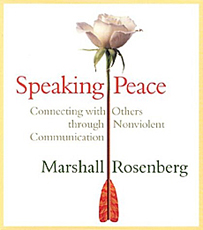Marshall Rosenberg has initiated peace programs in war-torn areas of Rwanda, Nigeria, Malaysia, Indonesia, Sri Lanka, the Middle East, Serbia, Croatia, and Ireland. A clinical psychologist, he is the founder and director of educational services for the Center for Nonviolent Communication (CNVC), an international nonprofit organization that offers workshops and training in 30 countries. Dr. Rosenberg is the author of Nonviolent Communication: A Language of Life. On this 2 1/2-hour presentation delivered on two CDs, he outlines a four-part model that will help you tap into the divine Source within and express the compassion and empathy you have for others. As Rosenberg puts it, this way of connecting with others brings out the best in us by attuning us to our natural desire to be of service.
The author begins by describing some of his encounters with violence and hatred: his childhood in the summer of 1943 in Detroit, Michigan, a race riot that killed over 40 people, and his being persecuted at school for being a Jew. Two questions are central to the process of nonviolent communication: What is alive in you and me at this moment? What can I do to make life more wonderful for you?
Rosenberg goes on to discuss the four components of NVC. First, we observe what is going on in a situation that is either enriching our lives or not. Then we state how we feel when we observe this action. This is sometimes difficult because if we have not been trained in the process, we may lack a vocabulary for our emotions. Thirdly, we say what needs of ours grow out of these feelings. The final step is to request in a clear and honest way what we want from the other person. Rosenberg gives plenty of illustrations of the obstacles we face when we try to act with compassion and empathy in a daily world filled with confrontation.
This presentation also contains the author's ideas on restorative justice versus punishment, finding energy to do the work, the importance of gratitude, and the gigantic hurdles of making observations without evaluations. On the latter, Rosenberg concludes: 'When people can get over their diagnoses of each other — their judgments, evaluations, criticisms — and connect to what's going on in each other, conflicts which seem impossible to resolve seem to almost resolve themselves."
What you say next can change the world, says the author. Rosenberg has found some invaluable tools to help us connect with others and to defuse the fear, anxiety, and tension that exists when people are faced with conflict.
